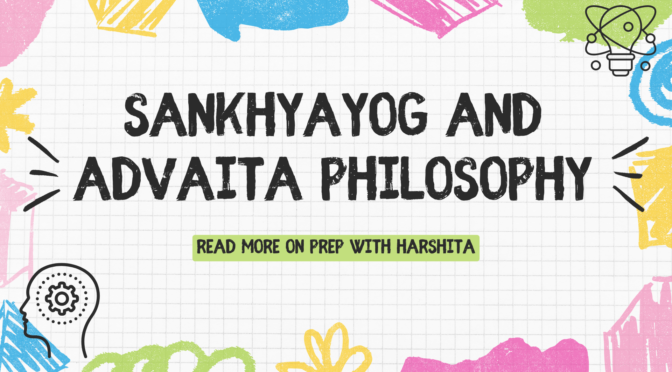Sankhya Yog and Advaita philosophy are two distinct schools of thought within Indian philosophy, each with its unique perspectives on reality, the self, and the ultimate truth. While these philosophical traditions mainly focus on metaphysical and spiritual aspects, they can also influence educational objectives and pedagogical practices, especially in the context of traditional Indian education systems.
Let’s Run about Sankhya Yog and Advaita Philosophy:
Sankhya Yoga:
Metaphysical Foundations:
Sankhya, attributed to the sage Kapila, is one of the six classical schools of Indian philosophy. It provides a dualistic metaphysical framework, distinguishing between the eternal and unchanging Purusha (consciousness or self) and Prakriti (matter or nature), which undergoes constant change.
Educational Objectives:
Sankhya philosophy encourages the pursuit of knowledge to understand the fundamental aspects of existence, including the distinction between the eternal self (Purusha) and the transient material world (Prakriti).
The educational objective is to guide individuals towards self-realization and liberation (moksha) by cultivating a deep understanding of the metaphysical principles outlined in Sankhya.
Pedagogical Practices:
Scriptural Study: Sankhya philosophy places importance on studying sacred texts like the Sankhya Karika to grasp its theoretical foundations.
Meditation and Contemplation: Practices like meditation and contemplation are an important part to Sankhya Yoga, aiding students in understanding the nature of the self and the material world.
Also Read: Assumptions about Human Nature
Advaita Vedanta:
Metaphysical Foundations:
Founded by Adi Shankaracharya, Advaita Vedanta is a non-dualistic philosophy that talks about the ultimate reality (Brahman) as one, without any multiplicity. It teaches that the individual soul (Atman) is identical to Brahman, and the apparent diversity in the world is an illusion (Maya).
Educational Objectives:
- Advaita Vedanta seeks to lead individuals to a realization of their true nature as the ultimate reality (Brahman) and overcome the illusion of individuality.
- The educational objective is to foster spiritual knowledge and direct experience of the non-dual nature of reality, leading to liberation (moksha).
Pedagogical Practices:
Study of Vedantic Texts: Advaita Vedanta places emphasis on the study of foundational texts such as the Upanishads, Bhagavad Gita, and works of Adi Shankaracharya.
Discourse and Debate (Shastraartha): Traditional pedagogical practices involve engaging in intellectual debates to refine one’s understanding and deepen insights into the nature of reality.
Read more on the next page..


Can you be more specific about the content of your article? After reading it, I still have some doubts. Hope you can help me.